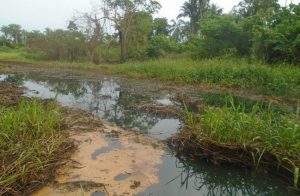The Health of Mother Earth Foundation (HOMEF), an environmental rights group, on Saturday, July 15, 2023, trained 80 residents of Ogboibiri, an oil-bearing community in Bayelsa State, on environmental pollution monitoring and reporting.

The Programme Manager, HOMEF, Mr Stephen Oduware, said during the training in Ogboibiri that the community was largely impacted by the activities of oil and gas industries in the area.
Oduware added that the people of the community, located at Southern Ijaw Local Government Area of Bayelsa, were in a better position to protect their environment and report any form of pollution affecting them.
He explained that the goal of the training was to bring the people together to highlight and document their environmental challenges caused by pollution.
The programme manager added that the skills would enable them to document their experiences and how environmental pollution was affecting their daily lives.
He noted that the activities of international oil companies in the area were polluting the environment, with recorded oil spills and gas leakages in 2015, 2021 and 2022.
This, according to him, has resulted in environmental pollution and degradation, adding that many of the farmers and fishermen in the community have lost their means of livelihood.
“Fishermen and women can no longer go to the river to fish, because the water is highly polluted, and you know you cannot find fish in the soup of oil.
“The people are also concerned that a particular species called ‘Mama Coco’, a cherished specie of cocoyam, is extinct in the community and other crops and tubers are experiencing low yield,” he said.
He said that the training was also organised to stand in solidarity with the people, and to assure them that “together, we can push and fight for a healthy environment”.
According to him, the capacity building training will enable the community members to advocate for sustainable environmental practices and speak up on what they want in their community.
“It may take time, but we will make progress at the end of the day.
“The training covers sessions on community governance to enable them to partner with relevant stakeholders including civil society organisations to amplify their voices.
“This will make their voices heard by government officials and policy makers and eventually create the change that they want to see in their community.”
Oduware urged the oil companies working in the community to stop the spills and conduct regular assessments of the health status of the people.
He also called on the companies to carry out environmental cleanup and restore the livelihood of the people affected by environmental pollution due to their activities.
On his part, Mr Morris Alagoa, Programme Manager, Environmental Right Action (ERA), Niger Delta Resource Centre, said that the training would enlighten the people on environmental pollution and mitigation procedures.
Alagoa argued that oil spill was among environmental pollution that affects the healthy living of rural dwellers.
“We are here to empower the community members on how to reach out to the government, the oil firms, and the media with concerns relating to environmental pollution.
“This will equip them with the needed skills to deal with their issues,” he said.
Also, Mr Monday Zeworitin, Project Officer, ERA, described pollution as the “alteration of the natural physico-chemical characteristics of an entity, medium or matter” because of the presence of substances or compounds.
He said that oil spill was a form of pollution caused by accidental release of liquid petroleum hydrocarbons into the environment due to human activity.
“These spills load the marine environment with a lot of dangerous chemicals that are detrimental to life under water.
“When exposed to oil, adult fish may experience reduced growth, enlarged livers, changes in heart and respiration rates, fin erosion, and reproduction impairment.
“Oil also adversely affects eggs and larval survival,” he said.
Residents of the area had fled the coastal community several times from 2013 to date, following massive gas leakages from nearby oilfields.
By Shedrack Frank
